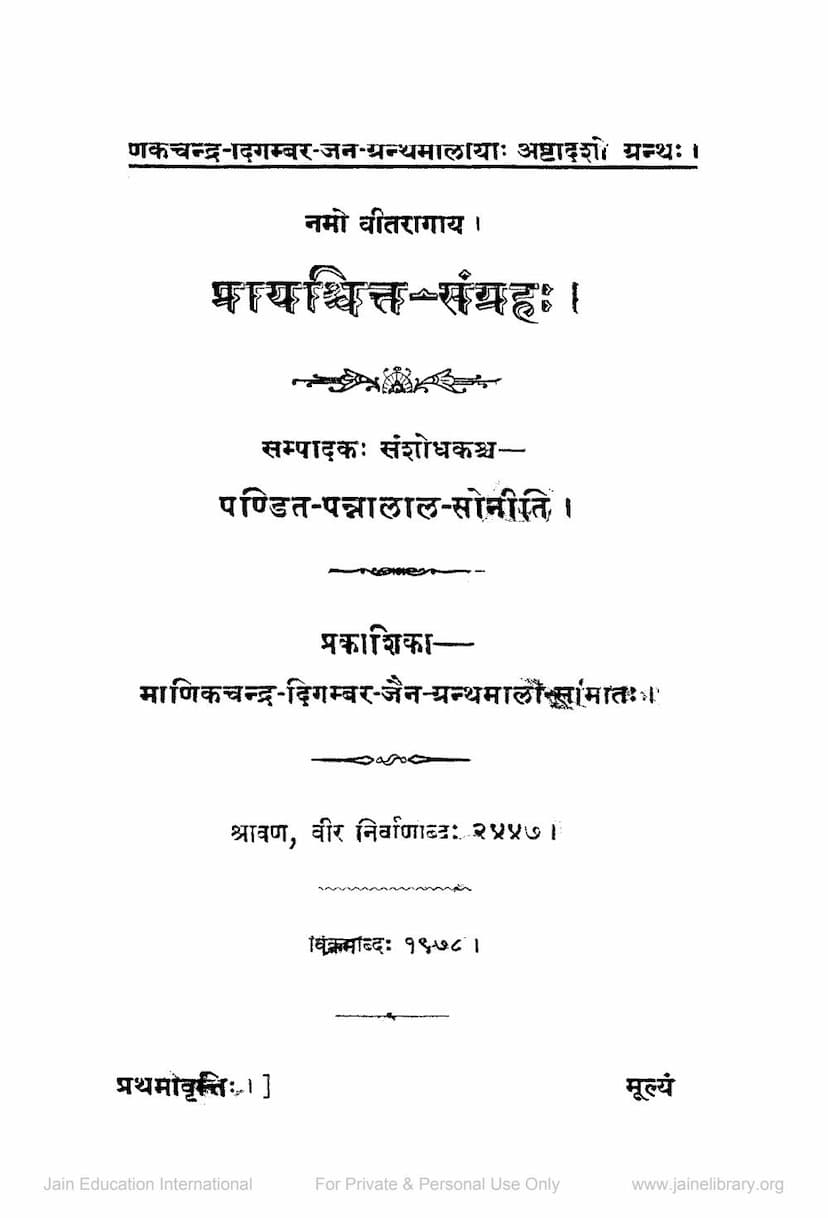Prayashchitta Sangraha
Added to library: September 2, 2025

Summary
Here's a comprehensive summary of the Jain text "Prayashchitta Sangraha" by Pannalal Soni:
Overview:
The "Prayashchitta Sangraha" (Collection of Expiations/Penances) is a significant Jain compilation published by the Manikchand Digambar Jain Granthamala Samiti. Edited and researched by Pandit Pannalal Soni, this book addresses a topic that was previously uncompiled and not widely accessible in Jain literature. The collection aims to provide comprehensive information on various forms of prayashchitta (expiations) for monks and householders, drawing from several key texts.
Content and Structure:
The Sangraha comprises four distinct works related to prayashchitta:
-
Chhedapinda (छेदपिण्ड):
- Language: Prakrit, with a Sanskrit translation provided by Pandit Pannalal Soni.
- Content: This text details various expiations. The exact original number of verses is debated due to variations in manuscripts, but it's estimated to be around 333 gathas (verses) and 420 shlokas (couplets).
- Manuscripts: The edition was based on two manuscripts: one from the Patodi temple in Jaipur (considered mostly accurate) and another from the Dr. Bhandarkar Oriental Research Institute in Pune (found to be highly inaccurate). A third manuscript, the Indranandi Samhita, was received later but was also inaccurate.
- Author and Time: Attributed to Indranandi Yogiandra, possibly an Acharya of the Nandisangha. His guru and exact lifespan are unknown. The text is placed before Shak Samvat 1241 (1376 CE) based on references in other works, but some internal evidence suggests a possible later dating for the author, possibly the 14th century CE. The text is believed to be either the fourth chapter of Indranandi Samhita or a part of it.
- Significance: It covers various offenses and their corresponding penances, often expressed in terms of kayotsarga (standing meditation), upavasa (fasting), and kalyana (a form of penance).
-
Chhedashastra (छेदशास्त्र):
- Language: Prakrit, with a small commentary.
- Content: Also known as 'Chhedanavati' due to its 90 verses (though the printed version has 94), this text also deals with expiations.
- Manuscripts: Edited and revised from a single ancient manuscript of the Terapanthi temple in Mumbai, described as very old, worn, and with a damaged page, but generally accurate. No other copies were found.
- Author and Time: The author and commentator are unknown, making it impossible to determine the exact time of composition.
-
Prayashchitta-Chulika (प्रायश्चित्त-चूलिका):
- Language: Sanskrit, with a commentary.
- Content: This text is a commentary on the original work. The main text has 166 verses.
- Manuscripts: Printed from a single manuscript from the Bhandarkar Oriental Research Institute in Pune, dating to Samvat 1942 (1885 CE), which was noted as mostly inaccurate. No other copies were available.
- Authors: The original author is believed to be Shri Gurudas, whose name is unfamiliar in Jain history. The commentary is by Shri Nandiguru. Based on references in the commentary to Shri Nandiguru and Shri Chandrarya's works, the commentator is tentatively placed around the 11th century CE, making the original text potentially from an earlier period.
-
Prayashchitta Granth (प्रायश्चित्त ग्रंथ):
- Language: Not explicitly stated but appears to be in Sanskrit based on the citation of a scholar.
- Content: This work focuses on the expiations for householders (shravakas), containing 88 verses.
- Authorship and Time: Attributed to Shri Bhaṭṭa Akalankadev, but the editor suggests this might be a different Akalankadev from the author of major works like Tattvarthavartika. The style and content, including the use of the word 'mokala' (meaning abundance or greatness, also found in scriptures like Bhadrabahu Samhita) and the inclusion of penances like cow donation (which many acharyas discouraged), suggest a later origin, possibly after the 15th century CE. The editor notes discrepancies with the other three texts regarding penances for certain offenses.
Key Themes and Features:
- Comprehensive Coverage: The Sangraha aims to cover the entire spectrum of prayashchitta for various offenses committed by monks and householders, addressing different contexts, degrees of severity, and individual circumstances.
- Detailed Penances: The texts outline specific penances, often measured in terms of upavasa (fasts), kayotsarga (meditative postures), kalyana (specific penance rituals), and periods of time (months, years).
- Importance of Intent and Context: The texts implicitly and explicitly consider factors like intent (deliberate vs. accidental), the nature of the offense, the status of the person committing the offense, and the condition of the victim (e.g., monks, householders, different species of beings).
- Chronological and Authorial Research: The editor, Pandit Pannalal Soni, has undertaken significant research to establish the likely time periods and authors of these texts, often relying on intertextual references and stylistic analysis. He acknowledges the limitations and potential inaccuracies in his estimations.
- Preservation of Jain Heritage: The publication of this Sangraha is a significant contribution to preserving and disseminating important, yet previously less accessible, Jain canonical texts. It highlights the commitment of the Manikchand Digambar Jain Granthamala Samiti to promoting Jain literature.
- Methodology of Penance: The texts often involve a detailed breakdown of penances based on the number of offenses, the intensity of the fault (from minor carelessness to grievous transgressions), and the capacity of the penitent.
Editorial Contribution:
Pandit Pannalal Soni's role as editor and researcher is crucial. He not only compiled these rare texts but also provided Sanskrit translations for the Prakrit works, offered comparative analysis of manuscripts, and conducted extensive research on the authorship and dating of the texts, even while acknowledging the speculative nature of some of these conclusions. His introduction provides valuable context for the reader.
Overall Significance:
The "Prayashchitta Sangraha" is an invaluable resource for Jain scholars, monks, and practitioners seeking to understand and implement the principles of prayashchitta within the Digambara Jain tradition. It sheds light on the meticulousness of Jain ethical codes and the systematic approach taken to maintain spiritual purity and communal harmony.